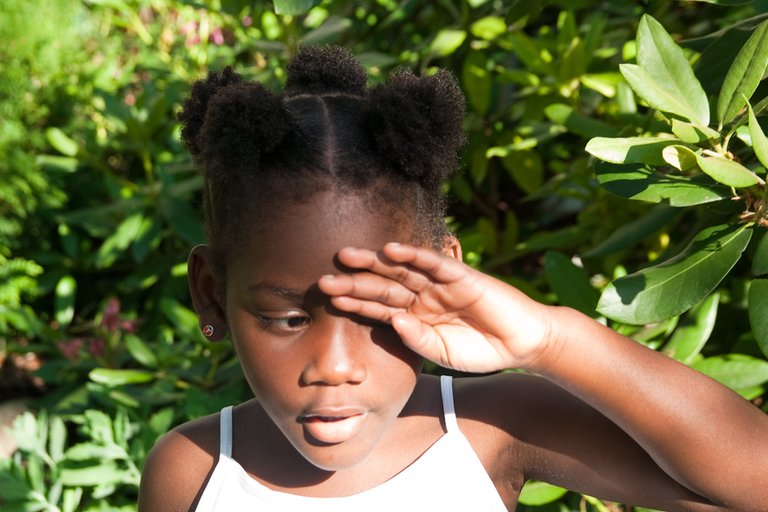Trichotillomania; A condition that makes people eat their own hair.
Probably, when you hear about someone pulling out his or her hair, you may begin to wonder if that doesn't seem abnormal, of course, it isn't completely normal because it could be a sign of a disorder which is called, Trichotillomania.
Trichotillomania is a mental health condition otherwise known as hair-pulling disorder, the process is a constant, repeated, and irresistible urge to pull out hair from the eyebrows, scalp, and other areas in the body. This urge is highly irresistible because even when the affected patient tries to stop, he cannot control himself.

flickr.com
The symptoms of trichotillomania are not just limited to pulling off the hair, other symptoms are involved;
- An increased tension before the hair is pulled out.
- Feeling good/pleasurable whenever hair is pulled out.
- Chewing, biting the pulled-out hair.
- Playing with pulled-out hair, or rubbing it on the face or lips.
- Experiencing great distress at work or social gatherings due to the pulling out of hair.
- It sometimes gets to the point of picking the skin, biting nails, or chewing lips.
- Pulling hair out of materials and dolls may be a quick sign.
- Constantly trying to pull out hair even when it is done without success.
Trichotillomania could be a symptom of emotion, it could be a way of dealing with uncomfortable or negative feelings like anxiety, stress, loneliness, frustration, extreme tiredness, and boredom. On the other hand, pulling out of hair provides a positive feeling to the individual who does it.
The cause of this disorder is not clear, just like several disorders, it may be as a result of the combination of genetic and learned factors. These factors will most likely increase the chances of trichotillomania;
Health conditions: Some skin or hair conditions make people feel uncomfortable, this will make these people focus on the pulling of hair or picking at their scalp.

academic-accelerator
Gene plays a significant role in the development of trichotillomania, in the presence of a close relative who has the condition, there is a possibility that a person will pick up the condition as well.
Trichotillomania usually happens before or during early teens, usually between the age of 10-13 and it remains a lifelong issue. Babies could be seen pulling out their hair, but it is usually a mild case and it goes away without any form of treatment.
Stress and boredom are other triggering situations that may result in trichotillomania. On the other hand, it could also be due to other conditions like OCD, anxiety, or depression.
The situation may even get out of hand and complications can happen as a result, let's check out some of those complications quickly;
The affected patient may begin to feel ashamed, frustrated, and embarrassed due to the hair loss, this will be due to low self-esteem, anxiety, and depression, in some cases, the affected patients could resort to drugs or alcohol.
Constantly pulling out one's hair could result in scarring, infections, and other damage done to the scalp or regions where the hair is pulled out. Eating one's hair could create a large, matted hairball that remains in the digestive tract, after some years, the hairball will begin to cause issues such as; vomiting, loss in weight, blockage to the intestine, and death eventually.
Treatment option for trichotillomania is usually habit reversal training which is aimed at reversing this life-threatening habit. The treatment usually involves;
Keeping a diary of the hair pulled out.
Helping the patient replace the hair pulled out with other actions like squeezing.
Provision of emotional support and encouragement from loved ones.
Other medications can also be administered; Antidepressants which can help to reduce the impulse to pull hair out, and antipsychotic medications will help to balance the chemistry in the brain. Anticonvulsants can also be recommended to help treat disorders and affect muscle movements, there are also nutritional products that can help to treat medical conditions.
Report every case of hair-pulling to a medical center as soon as you can is highly important, reporting on time and taking actions as required will prevent complications from happening.
References.
https://www.mayoclinic.org/diseases-conditions/trichotillomania/symptoms-causes/syc-20355188
https://my.clevelandclinic.org/health/diseases/9880-trichotillomania
https://www.nhs.uk/mental-health/conditions/trichotillomania/
Thanks for your contribution to the STEMsocial community. Feel free to join us on discord to get to know the rest of us!
Please consider delegating to the @stemsocial account (85% of the curation rewards are returned).
Thanks for including @stemsocial as a beneficiary, which gives you stronger support.